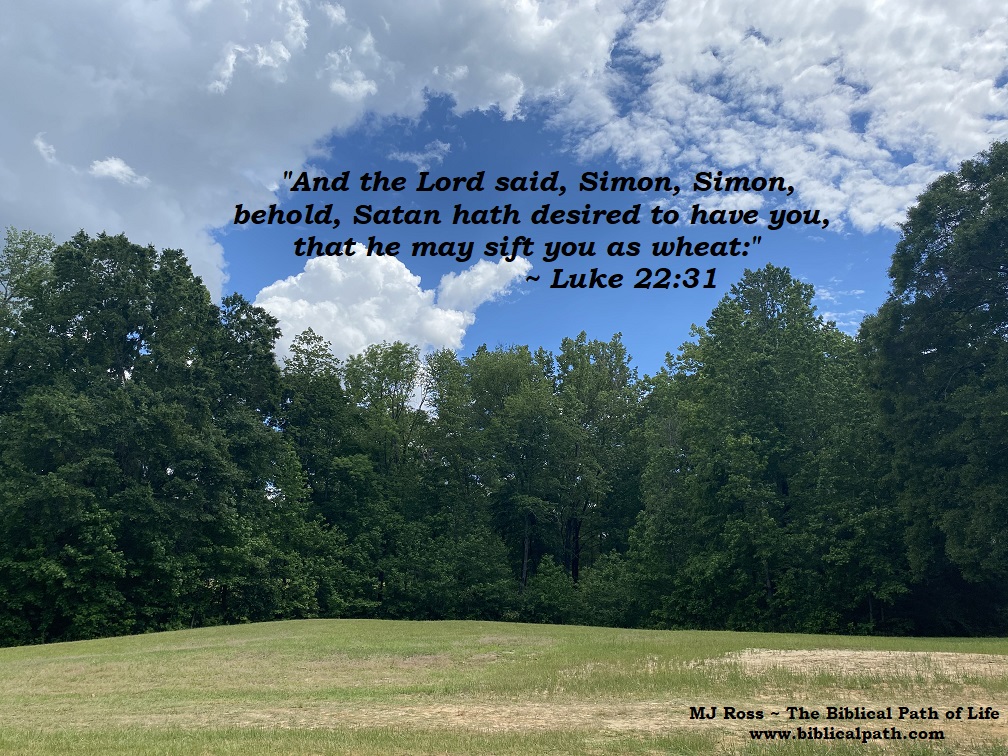
“But grow in grace, and in the knowledge of our Lord and Saviour Jesus Christ. To him be glory both now and for ever. Amen.”
2 Peter 3:18
The following is an excerpt from “The Biblical Path of Life – Year Three, Quarter Two” Lesson 6:
“During the time Peter stayed with Simon a tanner, Peter was taking that time of rest and retreat where he prayed. Recognize that God was ready to teach Peter something he needed to learn. While Cornelius’ men were on the way to Simon’s house, where was Peter? ‘… Peter went up upon the housetop to pray about the sixth hour‘ (Acts 10:9b). While Peter was praying, he became hungry, and fell into ‘a trance‘. Trance means “a sacred ecstasy or rapture of the mind beyond itself when the use of external senses are suspended and God reveals something in a peculiar manner.” Peculiar is exactly what we see. Read Acts 10:10-16 where Peter sees a sheet full of animals come down from heaven. God showed this to him three times, telling him to rise, kill, and eat. Nevertheless, Peter argued with God that the animals were unclean. However, God told him not to call common what God had cleansed. ‘Now while Peter doubted in himself what this vision which he had seen should mean, behold, the men which were sent from Cornelius had made enquiry for Simon’s house, and stood before the gate‘ (Acts 10:17). Peter had no idea what this meant, but while he ‘doubted in himself‘, men were at his door, asking for him. ‘19. While Peter thought on the vision, the Spirit said unto him, Behold, three men seek thee. 20. Arise therefore, and get thee down, and go with them, doubting nothing: for I have sent them‘ (Acts 10:19-20). Sometimes one does not learn what God wants them to learn – at first.
“See what Peter learned as he obeyed God’s instruction. What did he do? ‘Then Peter went down to the men which were sent unto him from Cornelius; and said, Behold, I am he whom ye seek: what is the cause wherefore ye are come?‘ (Acts 10:21). Read what they said to Peter. ‘And they said, Cornelius the centurion, a just man, and one that feareth God, and of good report among all the nation of the Jews, was warned from God by an holy angel to send for thee into his house, and to hear words of thee‘ (Acts 10:22). The men stayed with Peter, and the next morning went together to Caesarea – to see Cornelius. Read what Cornelius had done while he was waiting. ‘And the morrow after they entered into Caesarea. And Cornelius waited for them, and had called together his kinsmen and near friends‘ (Acts 10:24). Cornelius called is friends and family to his house. Not only would he hear the Gospel message that was promised to him, but his family and close friends would also hear and have opportunity to respond.
“Peter was really a special man used by God, but take note of his heart as you read the following verses. ‘25. And as Peter was coming in, Cornelius met him, and fell down at his feet, and worshipped him. 26. But Peter took him up, saying, Stand up; I myself also am a man‘ (Acts 10:25-26). Peter understood, and wanted these people to understand, that it was not Peter who was to be worshiped. God, and God alone, is to be worshiped (see Exodus 34:14).
“Recognize what Peter learned from the vision God had showed him. ‘And he said unto them, Ye know how that it is an unlawful thing for a man that is a Jew to keep company, or come unto one of another nation; but God hath shewed me that I should not call any man common or unclean‘ (Acts 10:28). That is why Peter went to see Cornelius.
“Cornelius told Peter what had happened to him (see Acts 10:30-33), ending with the following. ‘… Now therefore are we all here present before God, to hear all things that are commanded thee of God‘ (Acts 10:33b). All of the people present wanted to know what they must do to be saved.
“Peter reiterated what he had said before, about God teaching him that Peter was not to call any man common or unclean. You can almost see the light bulb going off in his head, as he was beginning to understand what God was trying to teach him. ‘34. Then Peter opened his mouth, and said, Of a truth I perceive that God is no respecter of persons: 35. But in every nation he that feareth him, and worketh righteousness, is accepted with him‘ (Acts 10:34-35). Worketh means “figuratively, to do, commit, practice.” Righteousness means “that righteousness which has regard to God and the divine law; internal, where the heart is right with God, piety toward God, and hence righteousness, godliness, i.e.: faith acceptable to God.” Peter was recognizing that he was there to tell these people about Jesus. He then proceeded to preach Jesus (see Acts 10:36-42). Specifically read Peter’s final words in this testimony, as from one who was a witness to what Jesus had done. ‘To him give all the prophets witness, that through his name whosoever believeth in him shall receive remission of sins‘ (Acts 10:43). What did it take to be saved? To believe on the name of Jesus, where the heart can become right with God.”
As Peter recognized that Jesus came to save anyone who would believe, by faith, in Him (see Romans 10:8-13), he grew in his Christian life. “But grow in grace, and in the knowledge of our Lord and Saviour Jesus Christ. To him be glory both now and for ever. Amen” (2 Peter 3:18). Peter encouraged Christians to continue to grow.
Do you continue to grow in your Christian life?
Do you know one who needs to believe in Jesus by faith?








